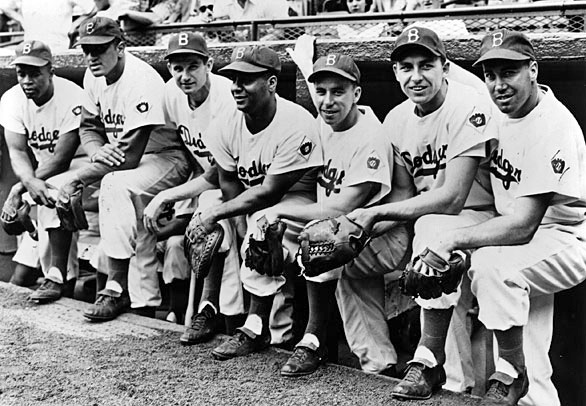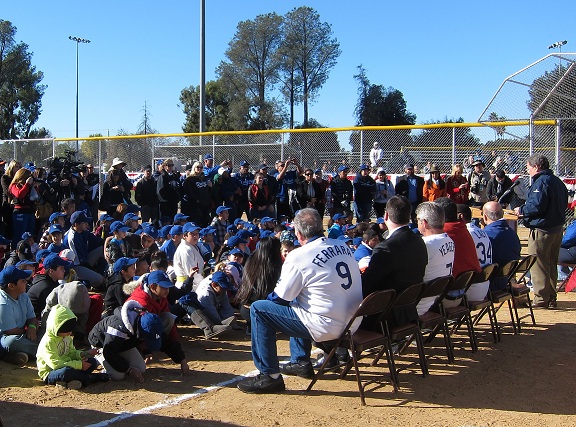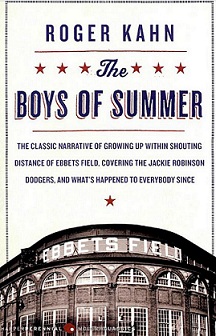Although I am almost embarrassed to admit it, I just finished reading the book ‘The Boys of Summer’ for the very first time – a book that was written by former journalist and noted bestselling author Roger Kahn in 1972, and a book that was selected by a Sports Illustrated panel as the greatest baseball book ever written. And while the book specifically chronicles the great Brooklyn Dodger teams of the late 40s and 50s, the book’s basic theme could apply to any baseball team at any given time in the 137-year history of the game. Granted, things today most certainly are not like they were in the late 40s and 50s, but for the most part, professional baseball has remained unchanged.
In the event that you have never read this wonderful book, one which I can now say is a must-read book for every baseball fan (and not just Dodger fans), I don’t want to spoil it by revealing too much about it, but the basic gist of The Boys of Summer is a detailed look at specific players in their prime and then a look at those same players roughly 25 years later after they had long since left the game.
As someone entering the the golden years of life, I can honestly say that the book has a much different meaning to me now than it would have had I read it when it was first released in 1972. I can say this with absolute certainty because 1972 also happens to be the year that I graduated from Burbank High School in Southern California (Go Bulldogs!); and for those of us so-called “baby boomers”, being 18 years old in the 60s and 70s, we were invincible and knew everything that we ever needed to know… or so we thought. Being in our late teens and early twenties, the last thing, and I mean the very last thing on our minds was getting old and most certainly dying. We pretty much felt as though we were going to live forever.

The Boys of Summer – Jackie Robinson, Don Newcombe, Preacher Roe, Roy Campanella, Pee Wee Reese, Gil Hodges and Duke Snider (AP photo)
The point to this and how it relates to The Boys of Summer and its incredibly talented cast of characters is this: No matter how good a baseball player is, and no matter how much money they make during their baseball career, it will… absolutely will one day come to an end, and there is nothing that they or anybody else can do about it – period.
I mention this not to make former baseball players (or anybody else, for that matter) feel old, but merely to point out that every baseball player will eventually be replaced, and in all but very few cases before their 40th birthday. The fact of the matter is that the only mere mortal baseball players who achieve immortality are those who God (and the Baseball Writers Association of America) have chosen to be enshrined in the sacred halls of Cooperstown, and even their mortal souls have already or will eventually pass.
Having gone through that period of invincibility in my late teens and early twenties (and actually survived), and having gained wisdom and experience over the subsequent decades, I am amazed (although not surprised) at the cavalier attitude and cockiness of the kids playing the game today – and trust me, they are kids playing a kids’ game. And while there is probably not much difference between the kids playing the game today than those who played the game in the 40s and 50s (except for the number of zeros in their contracts, of course), there are some huge differences. If I had to put my finger on just two, I would say arrogance and ego. Sure, these things were probably present in the 40s and 50s, but during my 50+ years as a fan, they seem far more prevalent today than in years past. It seems that very few of today’s players realize that their playing days are finite and numbered or that their careers could come to a screeching halt in a heartbeat.
This past Saturday, I attended the dedication ceremony for the latest Dodgers Dreamfield at Reseda Park in the heart of the San Fernando Valley; the 25th such Little League field of a scheduled 50 (one of the very few things that Frank McCourt did right). Obviously, there were plenty of local politicians and other civic dignitaries in attendance, but there were also several former Dodger players on hand to greet the hundred or so kids and their parents (and the gathered media). The former players were Al Ferrara, Lee Lacy, Ramon Martinez, Fernando Valenzuela and Steve Yeager and I noticed something about them that I have noticed with nearly every former professional baseball player I have ever met and/or came to know – they were all incredibly humble and grateful for the attention, respect and recognition given to them by fans of all ages.

Former Dodgers Al Ferrara, Steve Yeager and Lee Lacy were genuinely appreciative as Dodgers broadcaster Charlie Steiner introduced them at Saturday’s Dodgers Dreamfield dedication ceremony in Reseda. (Photo credit – Ron Cervenka)
Even though these former baseball players may be financially secure for the rest of their lives (some more so than others), they all seem to have one thing in common – they have come to realize that regardless of how great they may have been during their heyday or how many World Series rings they may have earned, they put their britches on exactly the same way that everybody else does.
In the emotional second half of The Boys of Summer, the former Brooklyn Dodger players were exactly the same. In addition to being incredibly humble and grateful for the attention, respect and recognition they were given, they had come to grips with their own mortality, both as former baseball players and as human beings – just as the boys of Reseda had.




 January 13th, 2013 at 6:10 am
January 13th, 2013 at 6:10 am  by Ron Cervenka
by Ron Cervenka 
 Posted in
Posted in 

Do you think that the humbleness also comes with maturity? I suspect that the arrogance we experience with today’s players (not all of them, mind you) will also pass with time. Steve Yeager is one example I can think of. Boomer was extremely brash when he was playing and retains some of that brashness today, but he and his treatment of fans has mellowed considerably over the years.
There is a very specific reason why I excluded Yeager in detail in this article other than by name reference, ebbetsfld. Bluenose Dodger knows the reason why, because he has this incredible knack for such things and usually at the worst possible time – for me, that is. 😆
The Yeager of today is absolutely incredible with fans – especially with kids – but more on that later (that’s a clue for you, Bluenose). 😉
I expect we all went through the know-it-all stage as teenagers. It reminds me of the story of the eighteen year old who felt his father didn’t know anything. When the young man turned 25 he was amazed at how much his father had learned in 7 years.
Mortality is ever present. Gil Hodges died at age 48, Jackie at age 53, DD at age 57, Billy Cox at age 58.
I would like to know why Newk didn’t get a chapter in the book. Andy Pafko was Dodger for a full season and part of another. Joe Black was a Dodger for 2 1/2 years. My only explanation would be that Roger Kahn was with the Dodgers in 1952-53 and Newk was in the military for those two years. It has been a long time since I read the book. Perhaps I have to read again to see why some players were highlighted and others not. Billy Loes was a Dodger for seven seasons and won 27 games in 1952-53, while Joe Black won 21, yet Loes doesn’t have a chapter.
I expect Dick is right. I think for those who might not have been humble, humility comes when they leave the game and no longer can do what we never could. I have read Duke at times wasn’t humble during his younger years, a bit temperamental, but as an Expo announcer there could not have been a more humble and appreciative man. I think arrogance comes when players feel they are above the game and the fans. Humility comes when they discover the game made them, they didn’t make the game. I expect guys like Steve Yeager are indeed humbled by fans who still seek them out after all these years and want a word or an autograph.
As you may recall, Harold, the book is quite long (and the print too damn small – haha) and Kahn spends a great deal of the first half of the book sharing his wonderful relationship with his father, who also passed at a very young age (Kahn notes that he was a very heavy smoker). This, in fact, was a very special and emotional part of the book for me, as it brought back many fond memories of my relationship with my father. The first half of the book also provided me with tremendous insight about sports journalism and establishing relationships with the players themselves, something that I am trying desperately to learn.
You may also recall that there was a lot of drinking back in those days and though there probably still is today, it is far less public (in most cases, that is). As such and knowing of the demons that some of these guys had to deal with in their retirement, especially Newk, I suspect that they were either unavailable to Kahn or that they simply didn’t want to talk about their past with him. As you know, all of Kahn’s post-career visits with the former Boys of Summer were pre-arranged by letter or phone call.
Newcombe and Loes are mentioned quite a bit in the first half of the book – especially Newk; but as you noted, there was no follow up with them in the second half. Here again, I think it boils down to their availability during the early 70s (when he wrote the book) or their desire to be left alone more so than Kahn snubbing them. I believe that he definitely would have included both of the former Dodgers in the book if they had agreed to meet with him.
I absolutely agree with both of you guys that humility comes with maturity and this did not go unnoticed by me as I prepared this article, but I honestly believe that like any former entertainer (of which baseball players are), once they are out of the spotlight (that is, the game itself), many of them have little else to fall back on. This is probably true more so today than in the 40s and 50s era of the game, primarily because of the insanely huge salaries that these kids make today.
I also believe that more players of that era came from the working class, whereas many of today’s players (probably most of them, in fact) grew up with a silver spoon in their mouths and never had to work a day in their lives; and that the only thing that they have ever known since childhood is baseball. Granted, there are exceptions to this, such as those who grew up in the inner-cities or in impoverished countries, but once their God given talents were discovered and developed, they pretty much had it made.
Don’t know if it’s a knack – more a suspicion and I do suspect after the forum post.